
Soon in Crónica: James Alexander Wyness’s “Igavene Olevikâ€

Futurónica 181

Episode 181 of Futurónica, a broadcast in Rádio Manobras (91.5 MHz in Porto, 18h30) and Rádio Zero (21h GMT, repeating on Tuesday at 01h) airs tomorrow, December 9th.
The playlist of Futurónica 181 is:
- James Alexander Wyness, Stoch e/a 1 (2016)
- Troum, Signe du Mirroir (2015, Acouasme, Cold Spring)
- James Alexander Wyness, Stoch e/a 2 (2016)
You can follow Rádio Zero’s broadcasts at radiozero.pt/ouvir and Rádio Manobras at radiomanobras.pt.
“Nowhere: Exercises in Modular Synthesis and Field Recording†reviewed by Aural Aggravation
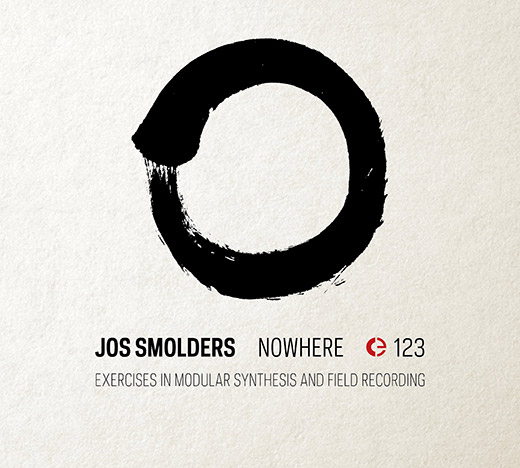
In the sphere of experimental and what one may reasonably term ‘fringe’ music, there is something of a propensity for descriptive titles. I’m quite a fan of these kinds of titles. Picking up Exercises in Modular Synthesis and Field Recording, I have a reasonable idea of what to expect. Granted, there’s no detail as to how these elements manifest sonically, I know I’m not going to get black metal or orchestral pop.
Smolders likens his process to that of the calligrapher, working with speed and precision. Operating with minimal interference or reworking once the process is under way, he is, he says, guided by the flow and the ‘here’ and ‘now’.
‘Incident at Ras Oumlil’ is constructed primarily from long, low rumbling drones interspersed with clicks and fizzy bursts of static. Voices rise; the words inaudible, but the tones of the clamourous crowd conveys a sense of agitation. Introducing an element of wordplay which reminds us that even nowhere is somewhere and is located temporally in time and space even if not geographically, ‘NowHere’ approximates the sounds of engines; trains and planes and whistling lasers. It’s evocative of something, but something so vague as to be an empty vessel from which echoes notions of travel, departure, passing through. We’re here, now, but where is here and when is now? Counterpart and companion piece, ‘NoWhere’ is barely there for the most part, with delicate chimes and rings hovering on the fringes of audibility, gradually building in its tonal range and density. The seventeen-minute ‘Up, Up and Back to 1982’ deals in sonic abstractions, shimmery analogue bleeps and twitters flit through a composition which transitions through a succession of seemingly independent segments.
These are sparsely arranged pieces, with emphasis on tone, texture and above all, space. Wibbly oscillations funnel between screeding noise, feedback and distortion. Slow, atmospheric swirls drift blankly against a backdrop off hums and crackles. At times manifesting as a sound which approximates little more than the rumble of a vinyl groove, at others bursting with sound on sound, Nowhere is attentively executed with a rare precision, navigating a route through a succession of temporo-spatial zones which linger long in the mind. Christopher Nosnibor
Natal dos Experimentais

Keeping up with what has already become a tradition, Crónica will present another edition of “Natal dos Experimentaisâ€. This year’s event will include performances by Vitor Joaquim, the Srosh Ensemble, Pal, Dirty Dirt, and Sturqen. Pedro Tudela will close the evening with a DJ set. Friday, December 9, from 22h onwards in Passos Manuel. As usual, all is free, and everyone’s welcome!
“Unfurling Streams†reviewed by Ether Real
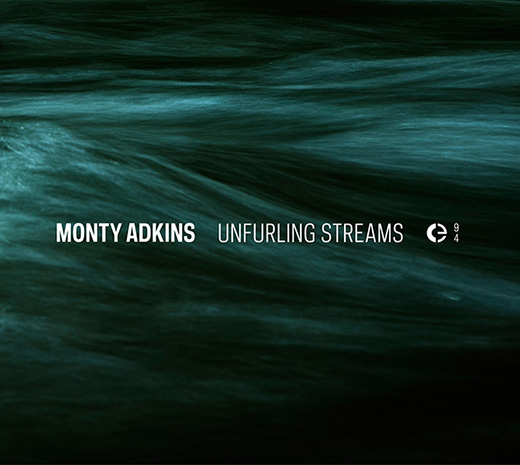
Depuis qu’on l’a découvert en 2011, Monty Adkins apparaît régulièrement sur ces pages avec un plaisir renouvelé. C’est chez Audiobulb qu’on le découvrait mais son champ de travail est assez large et lui permet d’apparaître sur des labels aussi variés que Signature (le label de Radio France) ou encore empreintes DIGITALes. On a cette fois la surprise de le retrouver sur la structure portugaise Cronica pour qui il avait déjà sorti un EP digital en 2014.
Pour schématiser, disons que Monty Adkins compose une musique ambient glitchy, piochant tour à tour dans les codes de l’electronica et des musiques néo-classiques. Pour arriver à ce style, on trouve généralement dans ses productions une base acoustique (tintements, clarinette…) et des traitements numériques, sonorités, effets, collages. Le procédé est ici repris en utilisant de nombreuses sonorités métalliques (tintements, résonances, grincements) en privilégiant un style ambient. Quelques tintements limpides, une résonance qui se prolonge à l’infini, des notes qui s’enchaînent et se croisent lentement, une poignée de bruissements et bouillonnements électroniques en arrière plan, c’est à peu près tout ce qu’il faut pour construire le très beau ufs_2.
Très beau, c’est un qualificatif que l’on pourrait utiliser pour décrire chacune des 6 pièces qui composent cet album d’une ambient délicate, précise, précieuse par endroit trouveront peut-être certains. L’album est extrêmement homogène puisque le style est strictement identique au fil des 45mn que dure cet album. Mais il arrive par endroit que le terrain soit un peu plus accidenté, à l’image du superbe ufs_3 qui gagne en relief quand ses subtiles mélodies sont appuyées par des basses profondes, et en richesse avec ses glitchs et claquements frétillants. Même constat sur ufs_5 et des élans grésillants qui finissent par exploser en vol.
On notera quelques titres un peu plus expérimentaux comme ufs_4 avec des mélodies plus discrètes et une musique qui s’appuie plus sur des petits bruitages qui nous laisse une impression générale de field recordings nocturne. Pour le reste, on a plus l’impression de faire une sieste dans un jardin ensoleillé, à se laisser bercer par le scintillement des rayons du soleil sur un plan d’eau. Ainsi les tintements de ufs_5 sont lumineux et prennent le temps. Une ambiance qui se prolonge sur le dernier titre qui fait une belle synthèse entre finesse acoustique, profondeur de quelques basses pour gagner en relief (on est ici proche de gongs), et légers frétillements de souffles et textures pour leur aspect organique.
Un album fidèle à ce que l’on pouvait attendre de Monty Adkins, une belle ambient qui mêle habilement électronique et acoustique. Fabrice ALLARD
via Ether Real
New in the Corollaries series: Tarab’s “Gleanersâ€
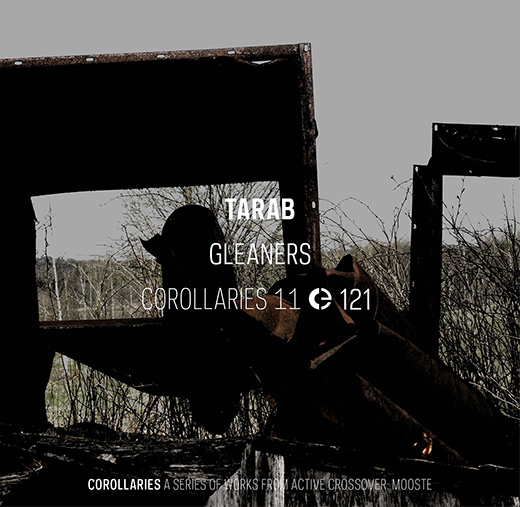
This is the eleventh release in the series Corollaries, that compiles works resulting from Active Crossover: Mooste, a cross-cultural collaborative residency curated by Simon Whetham and hosted by MoKS, in April and May 2015. All works are composed from material compiled in a collective archive during the project.
Gleaners rummages through the Active crossover: Mooste archive, gathering together the vestiges of our collective and disparate scurryings around the landscape. By allowing the background to almost free itself from the foreground and refusing to differentiate between incident, accident and intent, the various fragments have coalesced (with furtive guidance) into a form (in)determined by which of the residual pieces settled, and where they landed; and which pieces simply disappeared. All sounds have been extracted from recordings by or featuring: Tuulikki Bartosik, Fernando Godoy, Evelyn Grzinich, John Grzinich, Jim Haynes, Park Jin-Young, Rostislav Rekuta, Yiorgis Sakellariou, Dawn Scarfe, Maksims Shentelevs, Eamon Sprod, Taavi Suisalu, Arlene Tucker, Simon Whetham, James Wyness.
Tarab explores re-contextualised collected sounds and tactile gestures formed into dynamic, psycho-geographical compositions inspired by discarded things, found things, crawling around in the dirt, junk, the ground, rocks, dust, wind, walking aimlessly, scratchy things, decay and most if not all the things he hears and sees. More than simply documenting a given site, Tarab is interested in a direct engagement with our surrounds, teasing out half narratives, visceral sensation, false leads and heightened awareness.
“Gleaners†is a free download from Crónica or Bandcamp.
“Primary Reception†and “Alone Together†reviewed by Fluid Radio
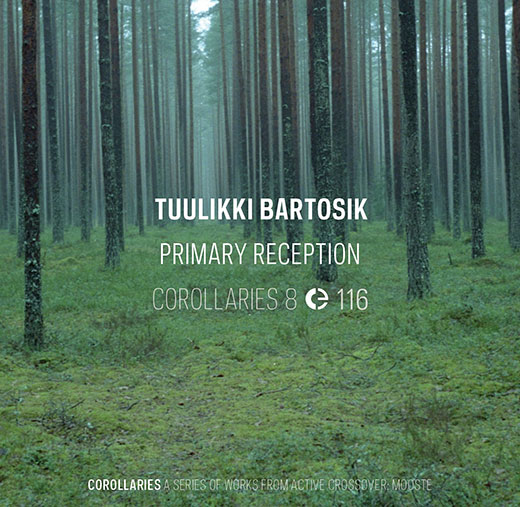
The ‘Corollaries’ series by Portuguese label Crónica collects works resulting from Active Crossover: Mooste, a cross-cultural collaborative residency curated by sound artist Simon Whetham in Estonia in 2015. All of the pieces released as part of the series were created using sound materials compiled in a collective archive during the residency. Different artists participated at different points in the project, often visiting and recording in different locations. However, many were particularly struck by hearing material recorded by other participants at the same time and place as they were working, as sound artist Dawn Scarfe recounts:
“The effect of reviewing these fragments is hallucinogenic: they evoke places that are similar but strangely different from how I think they should be, based on my own experience and mis-rememberings. I hear the same sequence of events rendered through the air that I recorded through a wire. Or a field transformed by variations in the weather and voices of migrant birds passing overhead when I wasn’t there to hear them.â€
Scarfe’s own contribution to the series, entitled “Alone Togetherâ€, does a good job of evoking this uncanny, haunting sense of fragmentation, using resonating tones, pushed sometimes to the edge of distortion, to transform a series of sonic events that would otherwise be quite generic. Clamouring flocks of squawking water birds are contrasted with the quiet chirp of an individual songbird or cuckoo in the hedgerows. Pitched sounds reverberate, ring, and thrum. The overall mood is nicely blank and impassive, shorn of any unnecessary sentimentality, and yet I get an impression both of the beauty of the recording locations and of the sense of aloneness Scarfe alludes to in the liner notes. A shared experience inevitably becomes a unique and personal secret in the private space of memory.
Whereas Scarfe’s path through the collective archive downplays the intentions of the composer in favour of a more direct form of listening to the environment, Tuulikki Bartosik’s “Primary Reception†presents a more active intervention into these recorded landscapes. Her big, open accordion chords are soon filling the dense air of a pine forest. A rambling melody sits beneath a blanket of roaring air, followed by the wooden knock-knocking of a percussive exercise recorded by other participants (including Scarfe) at another point in the residency. Towards the end Bartosik adds her own voice by singing softly, evoking an impression of timeless mystery in the depths of the ancient forest.
Although the Active Crossover residencies themselves are a fascinating concept and no doubt deeply rewarding for participants, these two releases suggest that the ‘Corollaries’ series, currently at ten editions, is more than simply a way of documenting the event. As well as compiling the reflections and (mis-)rememberings of those who took part in the Mooste residency, the series provides a fascinating opportunity to compare and contrast different approaches to the same material and situations, mapping the same terrain from different angles and perspectives. These differences in individual recollection and response in no way diminish the power of a shared experience, but rather deepen and enrich it through their diversity. Nathan Thomas
Futurónica 180
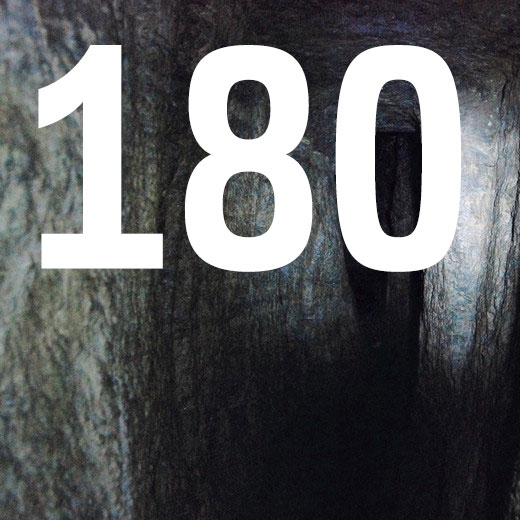
Episode 180 of Futurónica, a broadcast in Rádio Manobras (91.5 MHz in Porto, 18h30) and Rádio Zero (21h GMT, repeating on Tuesday at 01h) airs tomorrow, November 25th.
The playlist of Futurónica 180 is:
- Cem Güney, Are You the President’s Militant? (2016, Three Dots, a Jaw, and a Cul de Sac)
- Jonathan Uliel Saldanha, Fanfare from the Resonating Concrete Entrance (2016, Tunnel Vision, Silo Rumor)
- Jonathan Uliel Saldanha, Tunnel Vision (2016, Tunnel Vision, Silo Rumor)
- Cem Güney, Internal Diegetic Arcade (2016, Three Dots, a Jaw, and a Cul de Sac)
- Jonathan Uliel Saldanha, Ressurection of the Concrete Jungle (2016, Tunnel Vision, Silo Rumor)
- Jonathan Uliel Saldanha, Train Tunnel/Crane Dub (2016, Tunnel Vision, Silo Rumor)
- Cem Güney, Overproof Rasps From the Gutter (2016, Three Dots, a Jaw, and a Cul de Sac)
- Jonathan Uliel Saldanha, Fanfare from the Resonating Geophone (2016, Tunnel Vision, Silo Rumor)
- Jonathan Uliel Saldanha, Arca d’Ãgua (2016, Tunnel Vision, Silo Rumor)
- Cem Güney, Voodoo Empire (2016, Three Dots, a Jaw, and a Cul de Sac)
- Jonathan Uliel Saldanha, Crystal Breath Autopoiesis (2016, Tunnel Vision, Silo Rumor)
You can follow Rádio Zero’s broadcasts at radiozero.pt/ouvir and Rádio Manobras at radiomanobras.pt.
Soon in Crónica: Tarab’s “Gleanersâ€

